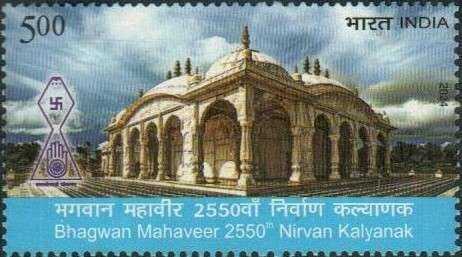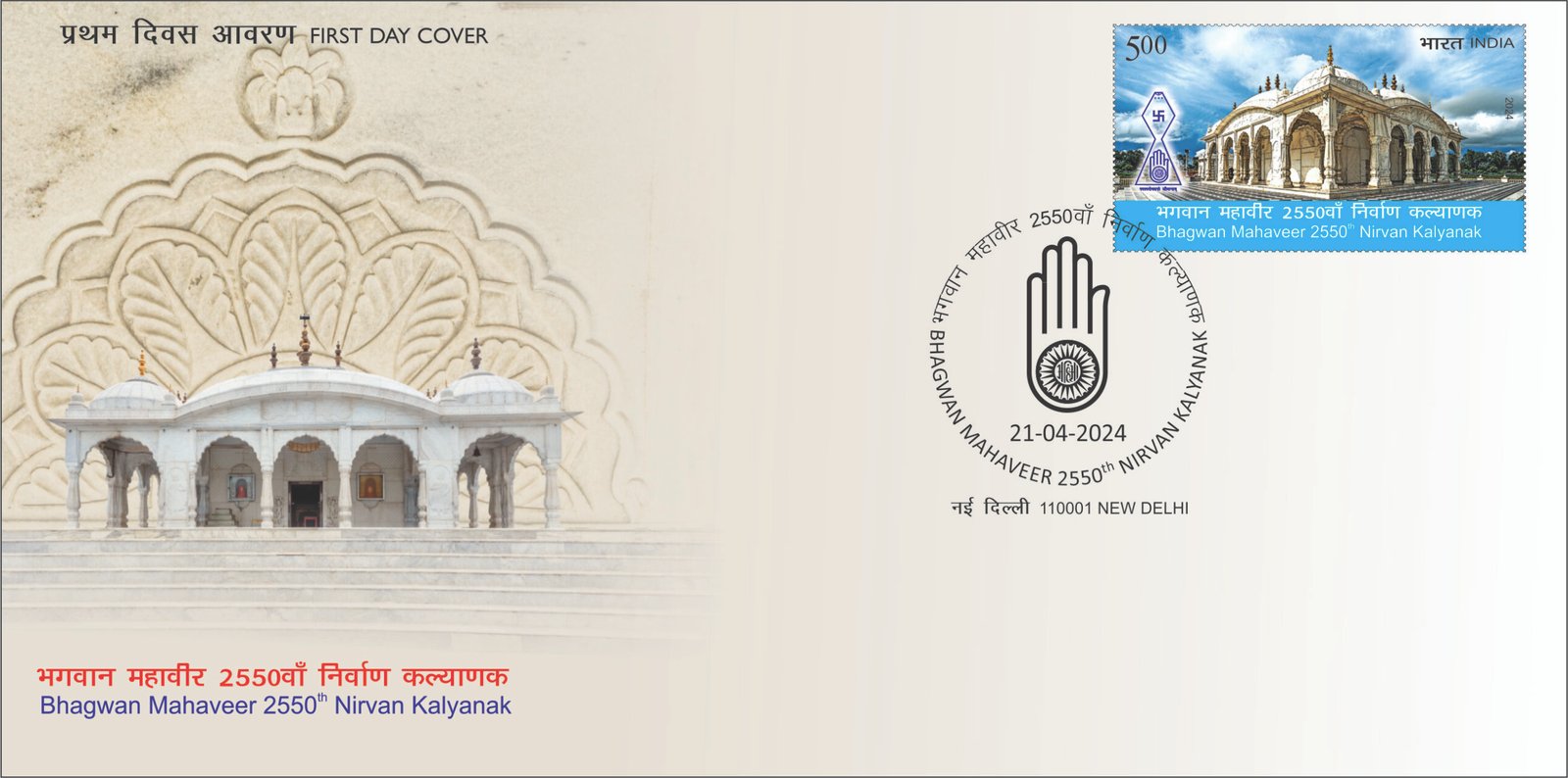Bhagwan Mahaveer 2550th Nirvan Kalyanak

Technical Data
| Date of Issue | April 21, 2024 |
|---|---|
| Denomination | Rs. 5 |
| Quantity | 201,600 |
| Perforation | 13½ |
| Printer | Security Printing Press, Hyderabad |
| Printing Process | Wet Offset |
| Watermark | No Watermark |
| Colors | Multicolor |
| Credit (Designed By) | Sh. Brahm Prakash |
| Catalog Codes |
Colnect codes IN 2024.04.21-01 Stanley Gibbons IN 3641 Stanley Gibbons IN 3905 |
| Themes | Festivals | Religion | Temples |
Honoring a Pioneer of Non-Violence and Equality
Bhagwan Mahaveer, the twenty-fourth and last Tirthankar of the Jain religion, stands as a timeless symbol of spiritual enlightenment, non-violence, and social reform. Born as Vardhaman, the son of King Siddhartha and Queen Trishala, he entered the world on the thirteenth day of Chaitra month, 599 B.C., in the affluent region of Vaishali (Vajj Sangha) at Kundagram in Bihar.
Early Life and Spiritual Quest
Blessed with unique qualities, Bhagwan Mahaveer was known by many names, including Vardhaman, Veer, Ativeer, Mahaveer, and Sanmati. He renounced royal life at the age of 30, leaving behind wealth and luxury to pursue a higher purpose. Adopting the life of a Digambara saint under an ‘Ashoka tree’ at Khandvan, Mahaveer embarked on an ascetic path driven by profound inner realization.
At the age of 42, after 12 years of rigorous penance on the banks of the Rupnadi River near Jurnbhikgram, Bhagwan Mahaveer attained Keval Gyaan (enlightenment). His teachings, rooted in compassion and simplicity, inspired people across the land, challenging societal norms and redefining the human approach to existence.
Revolutionary Teachings and Social Impact
Bhagwan Mahaveer’s contribution transcended mere religious discourse. He propagated the practice of Samayaktva (equanimity and truth), promoting self-discipline and detachment from material bonds. His experiments in meditation and rigorous self-exploration led to deep philosophical insights, laying the foundation for separating Pudgal (matter) and Jiva (soul).
Championing the cause of equality, Mahaveer shattered hierarchical structures, asserting that no one is superior or inferior based on caste, gender, or social position. He strongly advocated for empowering women, promoting celibacy as a tool of inner strength rather than societal restriction. His revolutionary ideas sought to dismantle discrimination and awaken society to true equality.
Non-Violence and Compassion: A Timeless Legacy
Bhagwan Mahaveer gave a profound new meaning to non-violence. He declared that non-violence (Ahimsa) is the supreme religion and the highest virtue. His teachings encouraged people to live and let live, fostering compassion towards every living being, and promoting peaceful coexistence.
His principle of Anekantavada (non-absolutism) encouraged embracing multiple viewpoints, promoting tolerance, and solving conflicts without aggression. His teachings continue to resonate, promoting a world where every individual can coexist harmoniously, respecting diversity and universal human values.
2550 Years of Enduring Influence
On Kartik Krishna Chaturdashi in Pawapuri (Bihar), Bhagwan Mahaveer attained Nirvana (liberation), marking a pivotal transition from a revered teacher to Siddha—a liberated soul. His life, dedicated to compassion, simplicity, and profound wisdom, remains a radiant testament in Indian history.
Commemorative Postage Stamp: A Tribute to Eternal Wisdom
To honor the 2550th Nirvan Kalyanak of Bhagwan Mahaveer, the Department of Posts, Government of India, proudly released a commemorative postage stamp. This tribute celebrates Mahaveer’s timeless message of non-violence, equality, and truth.
The stamp stands as a symbol of his vast contribution—not only to Jain philosophy but also to humanity at large. It reflects his enduring legacy of promoting peace, compassion, and universal coexistence, inspiring future generations to walk the path of righteousness.
First Day Cover

